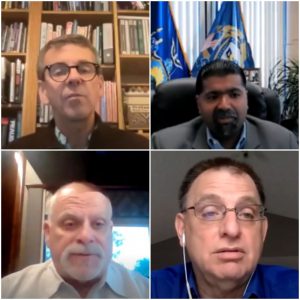Chair: Martin Gill
Panellists:
Glen Kitteringham – President of Kitteringham Security Group Inc.
Joe McDonald – CPP PSP CMAS, IFPO Board of Directors, Research Committee Chair
Mario J. Doyle – Chief Operating Officer of Doyle Security Services, Inc.
Key points
Joe McDonald highlights the findings from the recent IFPO report, and notes that it is somewhat novel to ask security officers what they think, yet the findings have been instructive. He calls for more focus on getting feedback from those who work on the frontline. This feeds into a more general point that Joe makes, about the value of communicating effectively, in different ways and at all levels. Security is not about guards, guns and gates as there is much more focus on customer service yet many still don’t know that. This feeds another problem, that often buyers purchase security officers without understanding either the value of the role or the complexities of the job and then don’t recruit the right people and it becomes a downward spiral. He underlines the importance of managers, at all levels, understanding their importance and the skill sets they need, another area where research is lacking. Drawing an analogy he points out that Apple brings out new phones regularly but they are all improvements and the security sector must think about the role of security officers in the same way.
Mario J. Doyle focusses on the need to address the concerns off frontline personnel. In his own company he has taken time to feedback the findings of the research and generate from them their ideas for improvement. Key is to improve the image off frontline staff, it starts with better training. Mario found that while officers may have had good training there is a need to ensure knowlegde is retained and updated; training cannot be a one-off tick box affair. Done well this leads to greater recognition; at present good work does not get recognised and it needs to. At a higher level companies need to choose their customers, he blames companies who underbid each other and do so because the profit (the mark up on labour cists) they can make is similar whatever the pay of frontline staff. Communicating with customers then is key, Mario makes the point that he wants to be viewed by them as a mission critical partner rather than a vendor. Also important is good management. Managers also often double as trainers and mentors, especially those close to the frontline, are important facilitators of frontline work and that role needs to be understood fully and supported appropriately.
Glen Kitteringham call on organisations to replicate the research in their organisations so they can understand the issues thrown up by the report in their own companies. He especially focusses on training and notes that the problem often rests with the trainers themselves, often not experts and not skilled in the art of instruction. Then there is the tendency for companies to judge training by the hours taught rather than the knowledge gained. He also draws attention to the finding that security officers see security work as challenging. Officers reported that they undertook complex jobs albeit the tasks were not difficult to learn, there was though often a problem with co- workers and their abilities and skill sets.
Frontline security is the visible face of the security sector. Many people, not least the public, form their assessment of the effectiveness of the whole private security sector on the competence of these frontline workers. We need to understand their concerns and respond appropriately and heed the research findings.
Martin Gill
4th November 2021


